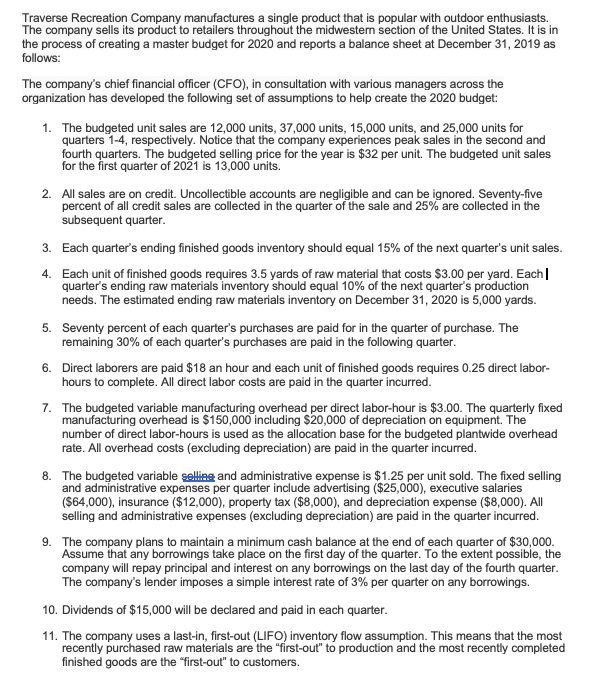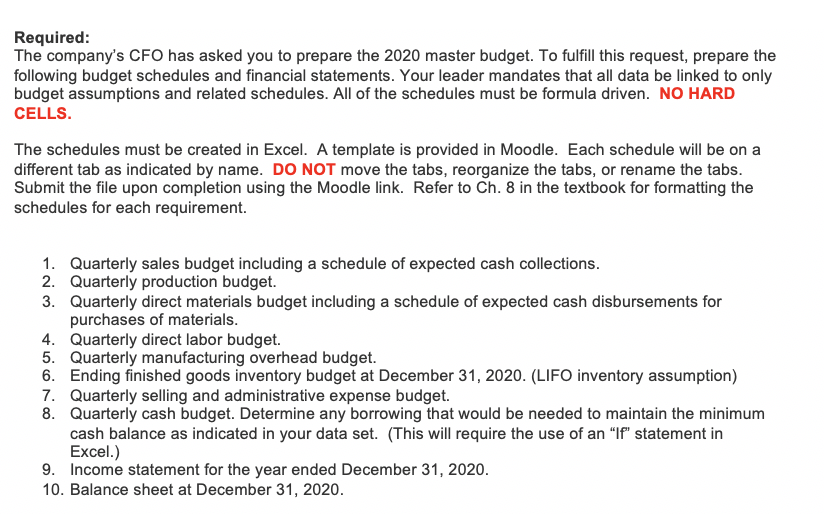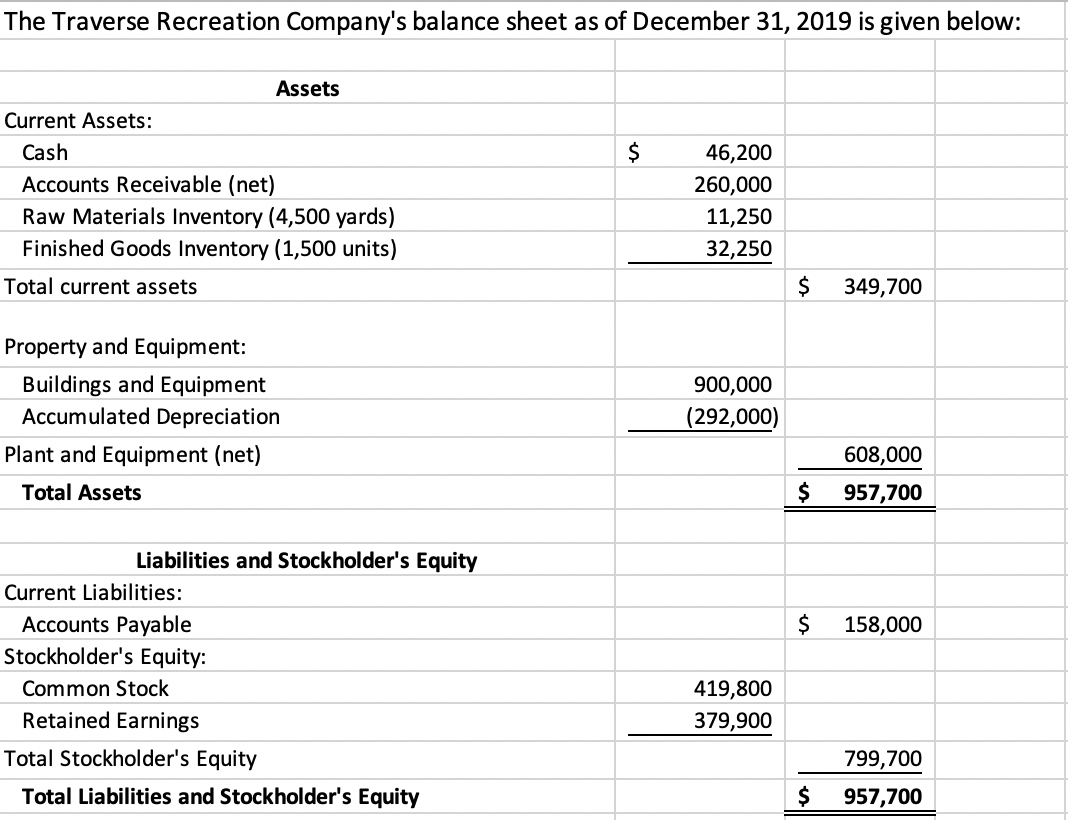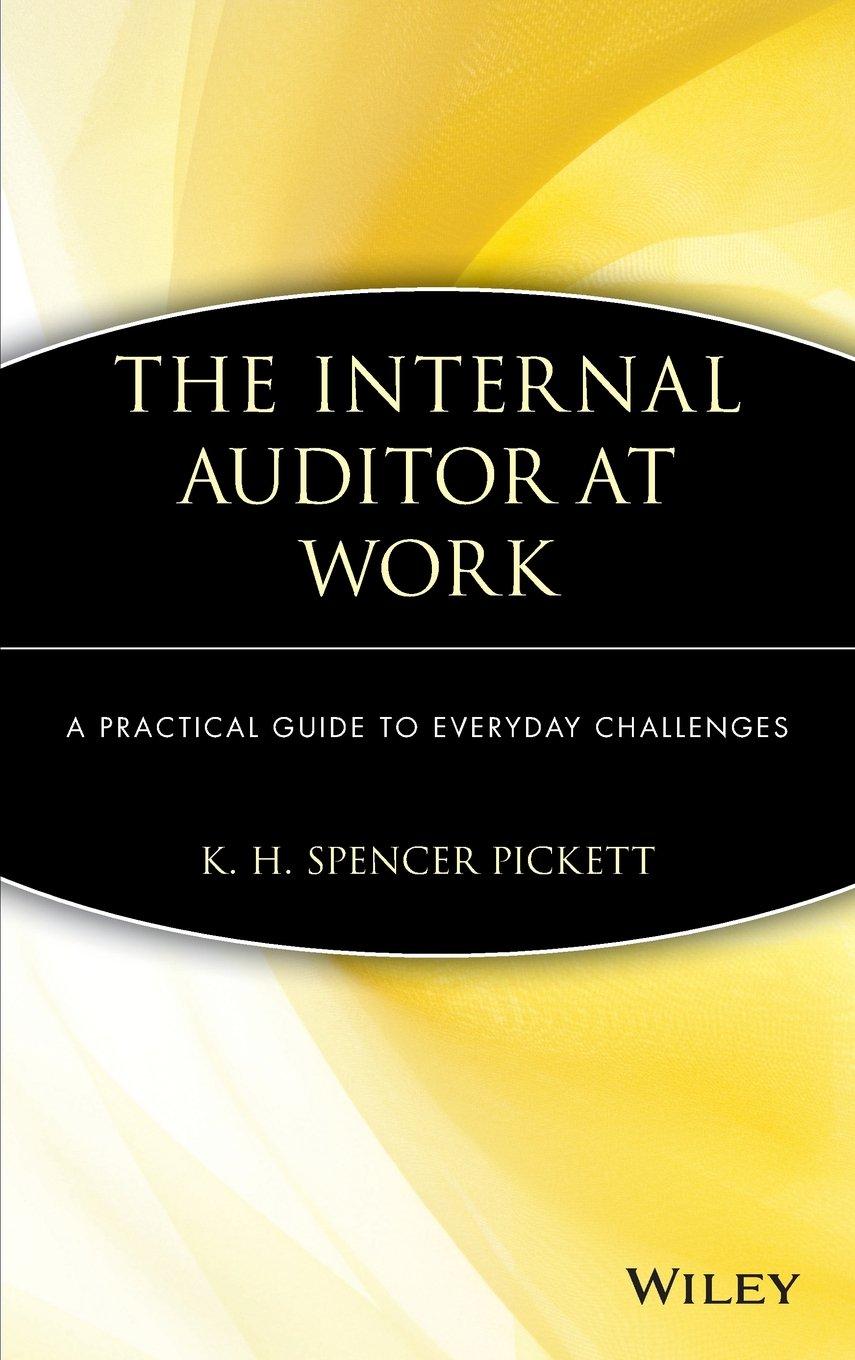Please show formulas!!! (I posted this question again because last answer I got did not show formulas in excel)
Please make sure all cells contain a formula instead of a hard number. Also, please link all sheets to each other.
Sheets below are needed:
Beginning balance (given in question submitted)
Assumptions
Sales budged and expected cash
Production budget
Direct material budget
Direct labor budged
Manufacturing overhead budget
Ending finished goods budget
Selling and administrative budged
Cash budget
Budgeted income statement
Budgeted balance sheet



Traverse Recreation Company manufactures a single product that is popular with outdoor enthusiasts. The company sells its product to retailers throughout the midwestern section of the United States. It is in the process of creating a master budget for 2020 and reports a balance sheet at December 31, 2019 as follows: The company's chief financial officer (CFO), in consultation with various managers across the organization has developed the following set of assumptions to help create the 2020 budget: 1. The budgeted unit sales are 12,000 units, 37,000 units, 15,000 units, and 25,000 units for quarters 1-4, respectively. Notice that the company experiences peak sales in the second and fourth quarters. The budgeted selling price for the year is $32 per unit. The budgeted unit sales for the first quarter of 2021 is 13,000 units. 2. All sales are on credit. Uncollectible accounts are negligible and can be ignored. Seventy-five percent of all credit sales are collected in the quarter of the sale and 25% are collected in the subsequent quarter 3. Each quarter's ending finished goods inventory should equal 15% of the next quarter's unit sales. 4. Each unit of finished goods requires 3.5 yards of raw material that costs $3.00 per yard. Each quarter's ending raw materials inventory should equal 10% of the next quarter's production needs. The estimated ending raw materials inventory on December 31, 2020 is 5,000 yards. 5. Seventy percent of each quarter's purchases are paid for in the quarter of purchase. The remaining 30% of each quarter's purchases are paid in the following quarter 6. Direct laborers are paid $18 an hour and each unit of finished goods requires 0.25 direct labor- hours to complete. All direct labor costs are paid in the quarter incurred. 7. The budgeted variable manufacturing overhead per direct labor-hour is $3.00. The quarterly fixed manufacturing overhead is $150,000 including $20,000 of depreciation on equipment. The number of direct labor-hours is used as the allocation base for the budgeted plantwide overhead rate. All overhead costs (excluding depreciation) are paid in the quarter incurred. 8. The budgeted variable selline and administrative expense is $1.25 per unit sold. The fixed selling and administrative expenses per quarter include advertising ($25,000), executive salaries ($64,000), insurance ($12,000), property tax ($8,000), and depreciation expense ($8,000). All selling and administrative expenses (excluding depreciation) are paid in the quarter incurred. 9. The company plans to maintain a minimum cash balance at the end of each quarter of $30,000. Assume that any borrowings take place on the first day of the quarter. To the extent possible, the company will repay principal and interest on any borrowings on the last day of the fourth quarter. The company's lender imposes a simple interest rate of 3% per quarter on any borrowings. 10. Dividends of $15,000 will be declared and paid in each quarter. 11. The company uses a last-in, first-out (LIFO) inventory flow assumption. This means that the most recently purchased raw materials are the "first-out" to production and the most recently completed finished goods are the "first-out" to customers. Required: The company's CFO has asked you to prepare the 2020 master budget. To fulfill this request, prepare the following budget schedules and financial statements. Your leader mandates that all data be linked to only budget assumptions and related schedules. All of the schedules must be formula driven. NO HARD CELLS. The schedules must be created in Excel. A template is provided in Moodle. Each schedule will be on a different tab as indicated by name. DO NOT move the tabs, reorganize the tabs, or rename the tabs. Submit the file upon completion using the Moodle link. Refer to Ch. 8 in the textbook for formatting the schedules for each requirement. 1. Quarterly sales budget including a schedule of expected cash collections. 2. Quarterly production budget. 3. Quarterly direct materials budget including a schedule of expected cash disbursements for purchases of materials. 4. Quarterly direct labor budget. 5. Quarterly manufacturing overhead budget. 6. Ending finished goods inventory budget at December 31, 2020. (LIFO inventory assumption) 7. Quarterly selling and administrative expense budget. 8. Quarterly cash budget. Determine any borrowing that would be needed to maintain the minimum cash balance as indicated in your data set. (This will require the use of an "It" statement in Excel.) 9. Income statement for the year ended December 31, 2020. 10. Balance sheet at December 31, 2020. The Traverse Recreation Company's balance sheet as of December 31, 2019 is given below: Assets Current Assets: Cash Accounts Receivable (net) Raw Materials Inventory (4,500 yards) Finished Goods Inventory (1,500 units) Total current assets 46,200 260,000 11,250 32,250 $ 349,700 Property and Equipment: Buildings and Equipment Accumulated Depreciation Plant and Equipment (net) Total Assets 900,000 (292,000) 608,000 $ 957,700 $ 158,000 Liabilities and Stockholder's Equity Current Liabilities: Accounts Payable Stockholder's Equity: Common Stock Retained Earnings Total Stockholder's Equity Total Liabilities and Stockholder's Equity 419,800 379,900 799,700 957,700 $









